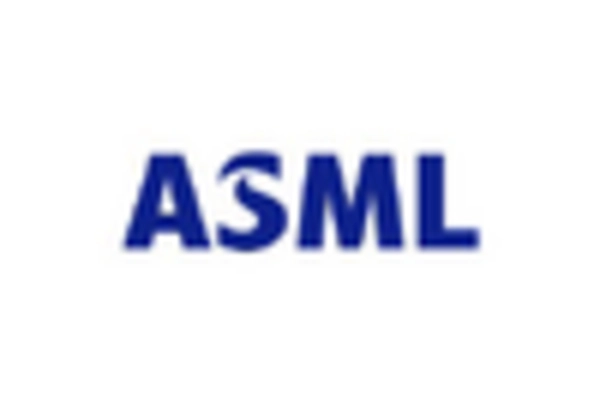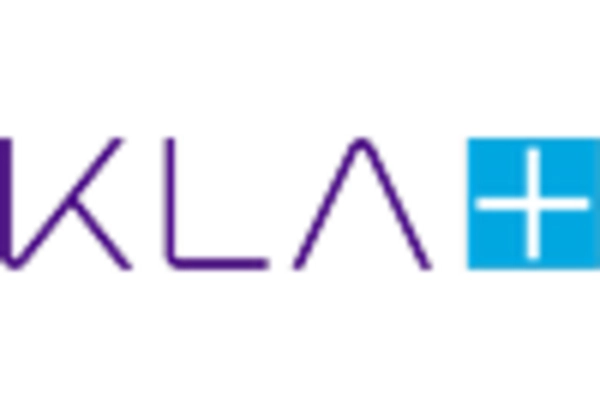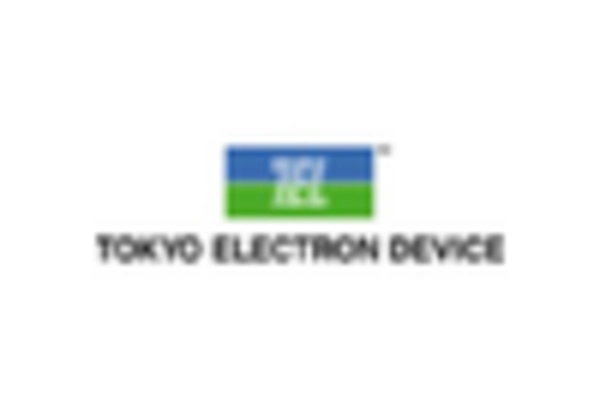Growing Focus on Sustainability
The growing focus on sustainability is emerging as a significant driver in the Robotics in Semiconductor Market. As environmental concerns gain prominence, semiconductor manufacturers are increasingly seeking ways to minimize their ecological footprint. Robotics can contribute to sustainability efforts by optimizing resource usage and reducing waste during the manufacturing process. For instance, automated systems can enhance energy efficiency, leading to lower energy consumption and reduced greenhouse gas emissions. Additionally, the ability of robotics to maintain high precision in production processes minimizes material waste, aligning with sustainability goals. This shift towards environmentally friendly practices is likely to attract investment and innovation within the Robotics in Semiconductor Market, as companies strive to meet both regulatory requirements and consumer expectations for sustainable products.
Cost Efficiency through Automation
Cost efficiency remains a pivotal driver in the Robotics in Semiconductor Market, as manufacturers increasingly adopt automation to reduce operational expenses. The implementation of robotic systems in semiconductor fabrication can lead to significant savings in labor costs and production time. For instance, automated systems can operate continuously, minimizing downtime and maximizing throughput. Reports indicate that companies utilizing robotics in their semiconductor processes have observed a reduction in production costs by up to 30%. This financial incentive encourages more manufacturers to invest in robotic technologies, thereby fostering growth within the industry. Furthermore, as competition intensifies, the pressure to maintain cost-effective operations compels semiconductor manufacturers to explore innovative solutions, further propelling the adoption of robotics in their production lines.
Technological Advancements in Robotics
Technological advancements in robotics are significantly influencing the Robotics in Semiconductor Market. Innovations such as artificial intelligence, machine learning, and enhanced sensor technologies are enabling robots to perform complex tasks with greater accuracy and efficiency. These advancements facilitate the automation of intricate semiconductor manufacturing processes, which were previously challenging to automate. For example, the introduction of collaborative robots, or cobots, allows for safer interactions between human workers and machines, enhancing productivity while maintaining safety standards. The continuous evolution of robotic technologies is expected to drive the market forward, as manufacturers seek to leverage these innovations to improve their production capabilities. As a result, the Robotics in Semiconductor Market is likely to witness an influx of new players and technologies, further enriching the competitive landscape.
Increased Investment in Research and Development
Increased investment in research and development (R&D) is a critical driver for the Robotics in Semiconductor Market. As the demand for advanced semiconductor solutions escalates, companies are allocating substantial resources to R&D initiatives aimed at enhancing robotic technologies. This investment is essential for developing next-generation robotics that can address the complexities of semiconductor manufacturing. Reports suggest that R&D spending in the semiconductor sector is projected to exceed 20 billion USD annually by 2025. Such financial commitment underscores the industry's recognition of robotics as a key enabler of innovation and efficiency. By fostering advancements in robotics, manufacturers can improve production processes, reduce costs, and enhance product quality, thereby solidifying their competitive position in the Robotics in Semiconductor Market.
Rising Demand for Advanced Semiconductor Technologies
The Robotics in Semiconductor Market is experiencing a surge in demand for advanced semiconductor technologies, driven by the proliferation of smart devices and the Internet of Things (IoT). As industries increasingly rely on sophisticated electronics, the need for high-performance semiconductors becomes paramount. This trend is reflected in the projected growth of the semiconductor market, which is expected to reach approximately 600 billion USD by 2025. Robotics plays a crucial role in enhancing production efficiency and precision, thereby meeting the escalating demand for these advanced technologies. The integration of robotics in semiconductor manufacturing processes not only streamlines operations but also reduces the risk of defects, ensuring that the final products meet stringent quality standards. Consequently, the Robotics in Semiconductor Market is poised for substantial growth as manufacturers seek to innovate and optimize their production capabilities.














